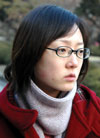AFTER STUDENTS were admitted by divisions rather than majors, the Student Association adopted the ban system. This system divides students into groups of 30~100 according to their departments. Some say it helps students adjust to school and make friends while others say it is meaningless and the relationships are superficial. The Yonsei Annals asked Yonseians what they think about ban .
Amy Rockwood 
Korean Language Institute student
I graduated from a university in the U.S. At my school, there were not any requirements for majors and you don't have to select a major until you are near graduation. I was a student in a liberal arts college, which consisted of about 3,000 students. Because of the number of students, the school requires freshmen to live in the dormitory, so students can more easily make friends. That's where I made all my friends. Since the ban and my school's requirement both helps students adjust to school and make friends, I think they are similar. Unless the ban system is mandatory, I think it is beneficial.
Park Ji-hye 
Soph., Col. of Law
Participating in ban activities is a good way to adjust to as well as enjoy university life. In my ban, there are about 40 students, so I think it is a good environment for making friends. Moreover, there are various clubs within the ban so students can enjoy their hobbies with friends. Finally, students usually participate in school events such as AKARAKA, the Yon-Ko Fete and nong-whal (volunteer work at farms) with ban friends. I feel sorry for students who do not participate in ban activities.
Lee Youn-joo 
Jr., Dept. of Korean Lang. and Lit.
Pres. of In-mun-1-ban
Since ban is a voluntary activity, it? a personal choice in how much you participate. However, I still feel that participating is best for students. Unfortunately, many students do not participate because they have busy schedules and must study hard to get good grades. Meanwhile, as a ban president, I find it difficult to coordinate events between student activists and non-activists as they have prejudices against each other. Breaking the wall between them is a difficult task.
Kim Kwan-ho 
Jr., Col. of Law
I did not participate in ban activities as a freshman. Alcohol is included in many ban activities and I felt uncomfortable when upperclassmen forced me to drink. Forcing people to drink and emphasizing the importance of ban rather than respecting personal opinions, are two factors why some do not participate in ban activities. Right now, I am in a law hakhoe (study group) and am satisfied with it. Upperclassmen and peers may seem to care less, but members respect each other.
Bae Jung-youn 
Sr., Dept. of Composition
The Dept. of Comp. does not have a ban. There are about 25 people in each year so everyone in my department knows each other and everyone participates in activities. Also, the atmosphere is very open and friendly, so I feel uncomfortable when I take courses in other departments. Since there are a small number of people compared to ban, we sometimes feel overpowered by other bans when we participate in events like AKARAKA and Yon-Ko Fete. But overall, I prefer the small number because we have closer relationships.
Hwang Yu-jeong 
Soph., Dept. of Political Science
I entered as an early admission student with a chosen major so I usually spend time with people from my department rather than ban. I think bans are helpful for freshmen because it links them directly to peers as well as upperclassmen. However, as the ban system is not organized by the school, it lacks structure and economic support. As a result, students have to pay money to sustain bans. I think the output of ban activities is small compared to the input.

